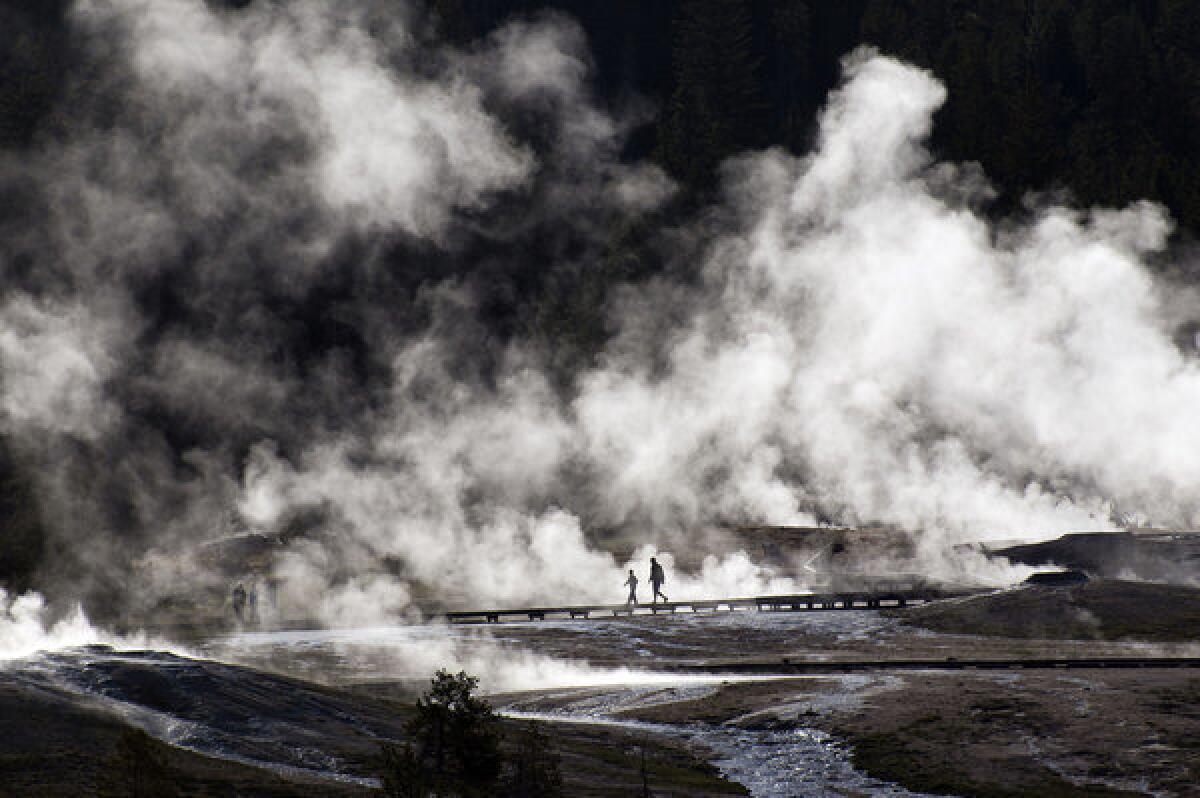Goldberg: Inhospitable Earth -- compared to what?

- Share via
You just can’t out-gloom an environmentalist. The Atlantic invited some luminaries to answer the question “How and when will the world end?” Some contributions were funny. Others simply plausible — a volcanic eruption from underneath Yellowstone National Park is frightfully overdue. But only an environmentalist like Bill McKibben could be a killjoy about the apocalypse itself.
The environmental activist and writer declares the question moot. “In a sense, the world as we knew it is already over. We have heated the Earth, melted the Arctic and turned seawater 30% more acidic. The only question left is how much more fossil fuel we’ll burn, and hence how unfamiliar and inhospitable we’ll make our home planet.”
It’s difficult to imagine a more absurd overstatement. I’m not referring to the exaggerated claim the Arctic has “melted.” And the acidification of the oceans is a real concern (though there’s reason to believe it’s not as bad as some say). But even Chicken Little wouldn’t call it proof the world is already over.
VIDEO: Climate change gets its close up
What’s truly ludicrous is McKibben’s use of the word “inhospitable.”
For something like 99% of human history, the world was really inhospitable. Strangers everywhere were greeted with bloodshed and attacked with cruelty. Dying from premature violence was more commonplace than dying from heart disease or cancer is today. In his classic, “War Before Civilization: The Myth of the Peaceful Savage,” Lawrence Keeley provides mountains of data documenting that in prehistoric societies, up to half of the population died from homicide, though 10% to 20% was closer to the norm.
In “The Better Angels of Our Nature: Why Violence Has Declined,” Steven Pinker shows that the world has become immeasurably more hospitable since the Industrial Revolution. Even World War II was an improvement. If the death toll had been equal to that of tribal societies, 2 billion lives would have been lost instead of a “mere” 60 million to 100 million. In the United States, violent crime is the lowest it’s been in nearly half a century.
Of course, McKibben is speaking of the physical environment. But by any conceivable measure — save, arguably, outdoor temperatures — the Earth is a vastly more hospitable place for humanity. When Pilgrims came to North America, it was often described as an inhospitable wilderness. Malaria, smallpox and yellow fever decimated immigrants (not to mention untold millions of Native Americans). Backbreaking labor was the only means of subsistence for millions of Americans for generations. Drudgery and toil — have you ever tried to churn butter? — were necessary for even the simplest pleasures. And does anyone dispute the improved lot of blacks and women?
Ironically, as global warming fears have risen, America and the Earth have gotten more, not less, hospitable. Since 1990, global poverty has been cut in half, and since 1970, extreme poverty has dropped 80%.
Rich and poor alike are eating better, despite global population growth. According to UNICEF, more than 2 billion people gained access to improved water sources between 1990 and 2010. In the developing world, meat consumption has more than doubled since the 1990s (after having doubled already since the 1960s). That’s because new technologies allow us to grow more with less. From 1940 to 2010, U.S. corn production quintupled while the land used for the crop shrunk.
“Globally,” writes Matt Ridley, “the production of a given crop requires 65% less land than it did in 1961.” And, he notes, the acreage required for all crops is falling 2% a year.
OK, things have gotten a wee bit warmer outside. But inside they’ve gotten vastly more hospitable, as we live longer, eat better, have more leisure time and have fewer deadly occupations. And even outside, the environment in the developed world has gotten vastly cleaner, healthier and more enjoyable since the 1970s as rich nations devoted more wealth to making things more hospitable. We can only hope poor countries get hospitable as quickly as possible.
Well, most of us can hope for such things. Others seem to think such gains come at too high a price.
jgoldberg@latimescolumnists.com
More to Read
A cure for the common opinion
Get thought-provoking perspectives with our weekly newsletter.
You may occasionally receive promotional content from the Los Angeles Times.










